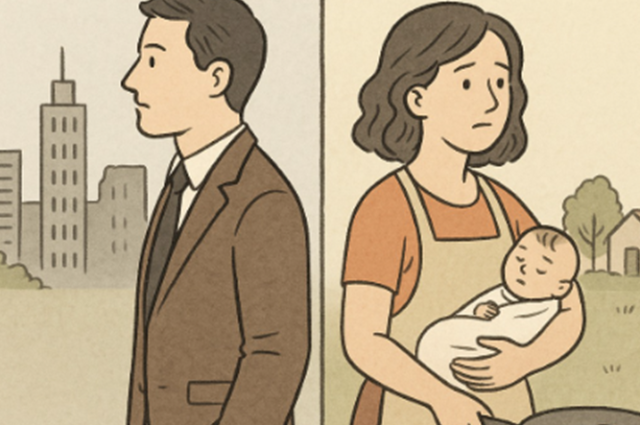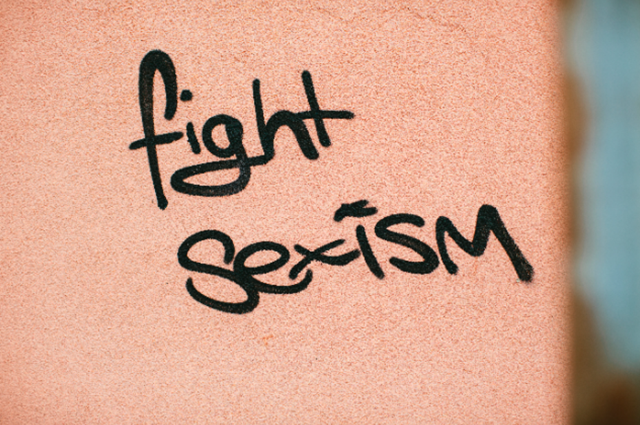Twin rails—forever parallel, never to meet.

Walk into an office, household, or social space, and it quickly becomes clear: men and women often live side by side, but not in the same world. Despite advances in tech, education, and rights-based discourse, men and women continue to inhabit fundamentally different realities. From how they are raised to how they communicate, from the burden of emotional labor to how society responds to their pain - the gap is deep and wide.
In this post-modern world, where empowerment is discussed more than practiced, women continue to disproportionately bear the brunt of emotional, physical, and economic strain. Meanwhile, men are often confined to stereotypes of toughness and stoicism, leaving little room for softness and vulnerability. I explore how gender divides aren’t just political or economic- they are deeply psychological and social- and how empathy, not anger, might be our best bridge across this divide.
The Weight of Empowerment
Modern society often claims to celebrate the empowered woman one who juggles a career, a home, and her ambitions with grace. But what we call “empowerment” often feels more like exhaustion dressed up as praise.
Today’s woman is supposed to lead meetings and teams while still managing to help their children with homework, and their mothers-in-law in the kitchen and also, somehow find time to take care of themselves. The result? Women are constantly exhausted, overworked, and left with little time for self-care or self-exploration.
In Lies Our Mothers Told Us, Nilanjana Bhowmick talks about how Indian women have inherited a contradiction: they are told they can “have it all” - career, family, and autonomy - yet are burdened with the near impossible expectation of “doing it all”. And when a crisis hits - whether it’s a child’s illness, an elderly parent needing care, or even a move to another city- it’s almost always the woman who is expected to sacrifice her job, even if it is the higher-paying one. Feminism, in practice, has handed women a to-do list rather than liberation.
Misunderstood Biology
There’s a long-standing and highly flawed myth that men are “naturally” superior because they’re physically stronger. From a biological perspective, the human body tends to develop either strength or flexibility- but rarely both in equal measure. These traits are often inversely proportional. Men, due to higher levels of testosterone, tend to build more muscle mass and are often physically stronger. Women, on the other hand, are biologically more flexible and agile, with a greater tolerance for pain - qualities that have their evolutionary value and strength.
Yuval Noah Harari, in his book Sapiens: The Brief History of Humankind, disrupts the myth that men are biologically more suited to dominance. He argues that for much of human prehistory, societies were more egalitarian. It was the agrarian revolution that led to property, inheritance, and patriarchal control, which in turn reduced women to tools of lineage and labor. He notes that the belief in female inferiority is a cultural context, not a biological truth.
This understanding is vital because it reframes inequality as a reversible accident of history rather than an inevitability of evolution. The question, then, is not “Can women lead?” but rather, “Why were they denied leadership for so long?”
So instead of saying one is superior, it’s more apt- and more honest- to say that women and men are optimized for different but equally important strengths. Thus, when we talk about physical differences, it’s not a matter of superiority, but of traits. And traits should never be used to justify systemic inequality.
They speak Finnish and Chinese!
One of the deepest fault lines between men and women isn’t visible- it’s in how they speak and interpret conversations. Deborah Tannen’s research explains that men often communicate to assert independence or status while women communicate to build connections. This difference doesn’t make one style better than the other, but it often leads to misunderstandings that are mistaken for conflict.
For instance, when a woman expresses a problem, she may want empathy and mere emotional support. But a man, conditioned to “fix” things, may offer a solution. She feels unheard and he feels unappreciated. They’re both trying - but from different worlds. This misalignment in expectations reinforces emotional distance. It’s not that men and women can’t connect, but that they need to recognize the lens through which each views language, emotion, and intimacy.
The Man’s World
The notion that men are universally privileged is simplistic. Yes, men benefit from patriarchy, but they also suffer under its weight. From childhood, boys are taught not to cry, to dominate, to “man up”. Over time, these messages don’t just shape behavior from a mask, one that men wear even when it’s suffocating.
This toxic idea of masculinity tells men that their worth lies in how much they earn, how strong they are, or how assertive they can be. But it leaves no room for emotional honesty. Men are expected to be protectors, providers, and decision-makers - but rarely nurturers or empaths. When men do express pain, anxiety, or fear, they are often dismissed or even ridiculed.
This cultural silence comes at a cost. Mental health issues among men are often ignored or undiagnosed, leading to higher rates of depression, substance abuse, and suicide. This emotional suppression not only isolates them—it makes them more likely to lash out or collapse silently under pressure.
Lady Justice
In both legal and social spheres, the burden of gender bias runs deep - and not always in the direction one might expect. While legal reforms in India and elsewhere have sought to protect women from historical oppression, they often do so at the cost of painting all men as aggressors and all women as victims. This overreaction creates dangerous blind spots in a system that should be rooted in fairness and evidence, not stereotypes.
Laws related to maintenance, alimony, domestic violence, voyeurism, and stalking are designed to shield women from exploitation and abuse. And rightly so- women remain disproportionately vulnerable, especially in patriarchal societies. But problems arise when the law presumes guilt based on gender, rather than evaluating the facts of each case. This turns protection into prejudice.
The Netflix Series Baby Reindeer is a gut-punching reality check. A man stalked and emotionally harassed by a woman tries to reach out, to be heard, to be helped. But no one listens. Why? Because male victims don’t fit the narrative. They’re invisible, dismissed, and even ridiculed. Closer to home, consider the Delhi traffic light incident. A woman falsely accused a man of eve-teasing and he was arrested on the spot. No questions, no benefit of the doubt - just handcuffs. It was only later that CCTV footage revealed the truth. But by then, his dignity had already been shredded.
Let’s be honest: one in three men experiences some form of sexual abuse. That’s not a minor statistic—it’s a silent epidemic. But our system doesn’t know what to do with male pain. There are no robust support structures, no legal empathy, and often, no language at all for what they go through. Vulnerable men are asked to “man up,” to shrug it off, to be strong. But at what cost?
And while we talk about legal safeguards for women, the ground reality is often another cruel joke. India’s legislative framework appears progressive—33% reservation for women in Panchayati Raj Institutions, equal pay mandates, menstrual leave, and maternity benefits. But how many of these policies empower women, and how many just look good on paper?
Visit a rural panchayat, and you’ll often find that the woman on the ballot isn’t the one in charge. Her husband or son sits in the chair behind her, whispering instructions—or worse, giving orders on her behalf. It's not a representation. It's puppetry with a feminist label.
Even seemingly gender-neutral policies can hurt women. The Supreme Court's requirement that aspiring judges must have three years of legal practice might sound fair—until you consider how many qualified women had to pause their careers for caregiving duties. This one-size-fits-all rule pushes them out of contention before they even get a seat at the table. Meritocracy doesn’t mean much when the starting lines aren’t the same.
So where does this leave us? In a system where men can't cry and women can't lead without being second-guessed, where laws meant to liberate sometimes end up trapping people in new kinds of cages. When we frame justice around gender rather than facts, we lose the plot entirely.
The fix isn’t to swing the pendulum the other way. It's to reframe the entire conversation. To make our legal and social systems radically empathetic—to believe survivors of every gender, to treat accusation and evidence with equal seriousness, and to remember that no one wins when justice chooses sides before hearing the story.

References
- Bhowmick, Nilanjana. Lies Our Mothers Told Us: The Indian Woman's Burden. Aleph Book Company, 2022.
- Harari, Yuval Noah. Sapiens: A Brief History of Humankind. Harper, 2015.
- Tannen, Deborah. You Just Don’t Understand: Women and Men in Conversation. William Morrow, 1990.
- Adichie, Chimamanda Ngozi. Dear Ijeawele, or A Feminist Manifesto in Fifteen Suggestions. Alfred A. Knopf, 2017.
- Netflix. Baby Reindeer. Created by Richard Gadd, 2024.
- Times of India. "Delhi Traffic Light Incident: CCTV Footage Clears Man Accused of Eve-Teasing," August 2023.
- Ministry of Women and Child Development, Government of India. Schemes and Policies.
- National Crime Records Bureau (NCRB), India. Crime in India 2022 Report.
- Centre for Civil Society. "Why Gender-Neutral Laws Matter," Policy Brief, 2021.
